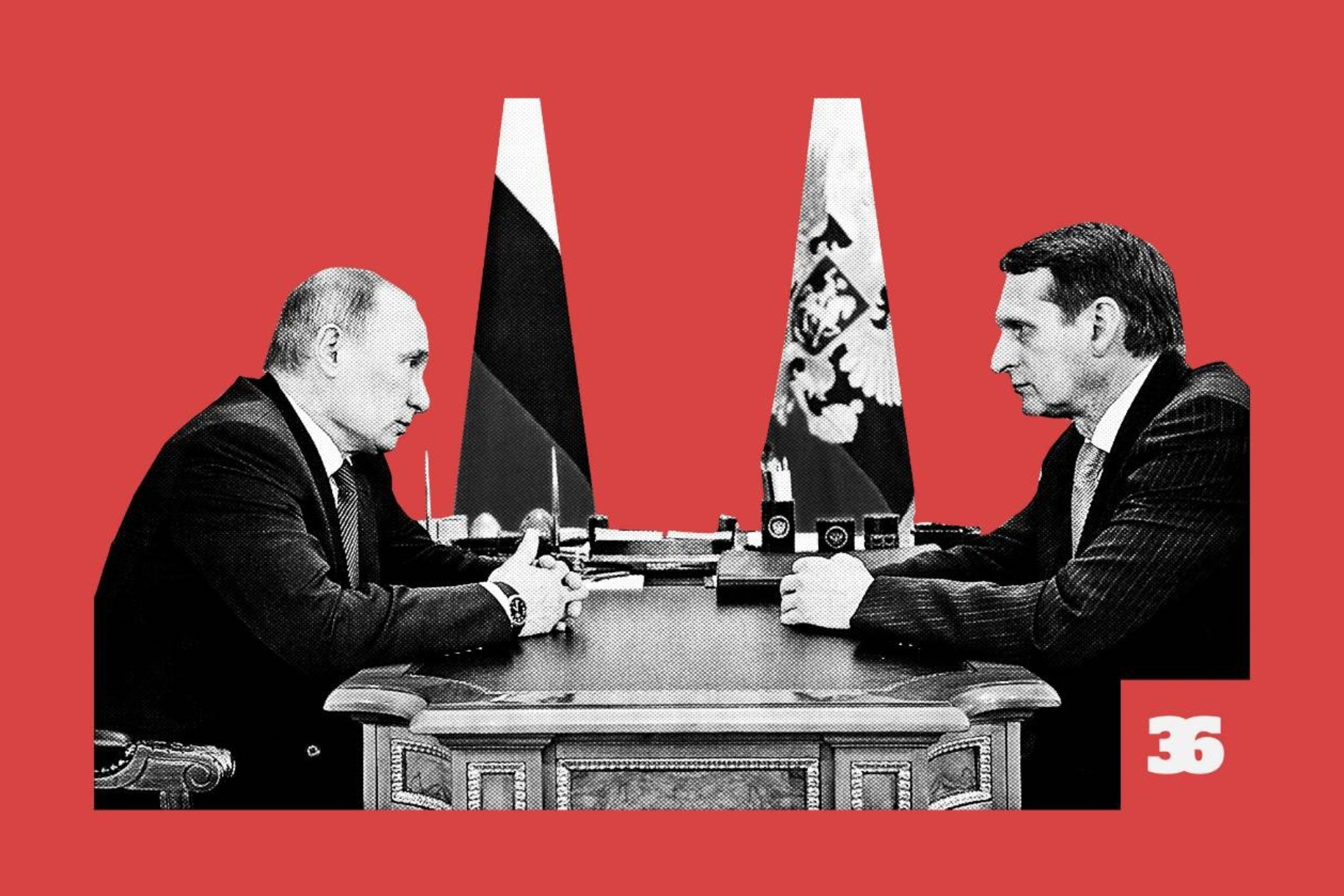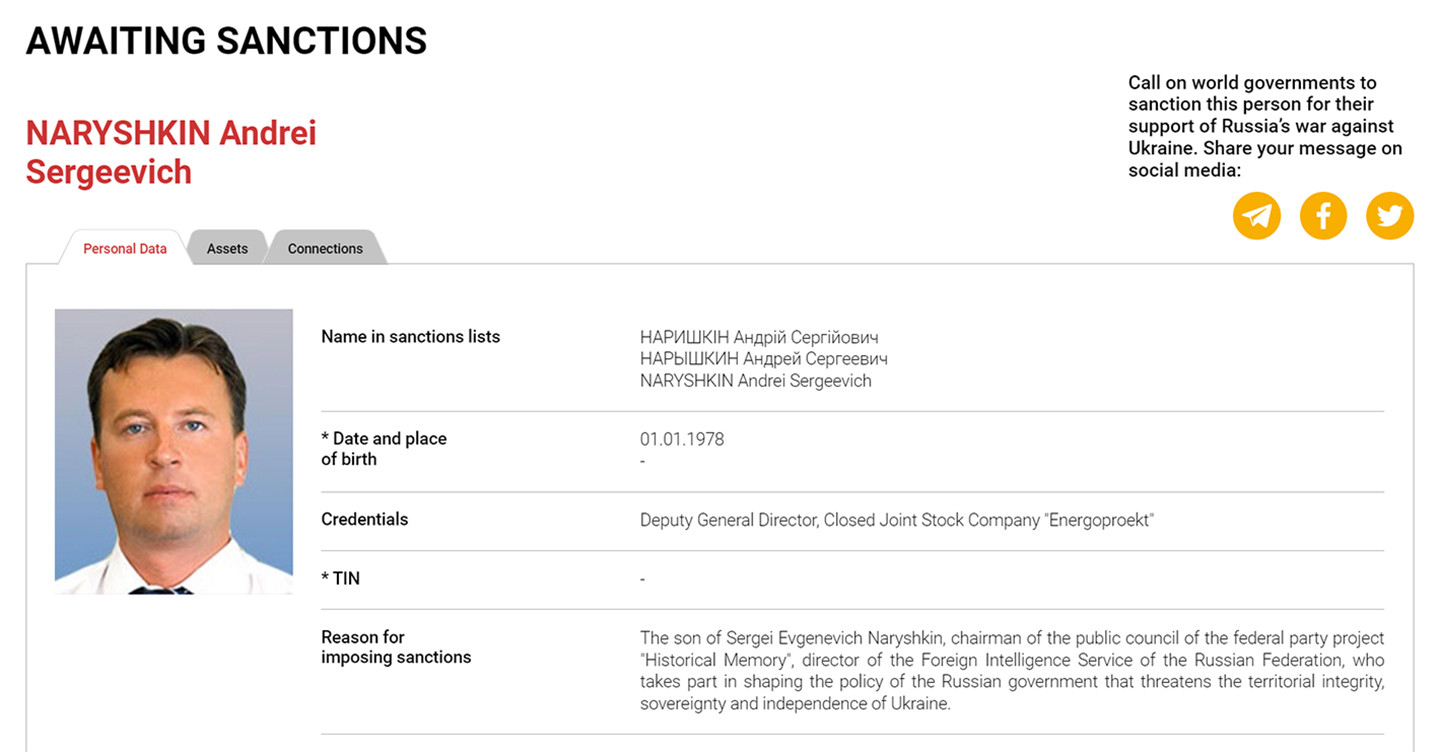Russian spy chief’s son has a Budapest home address. In the company property of an old friend of Orbán’s chief of staff

In one of the most popular shopping streets in downtown Budapest, Deák Ferenc Street, also known as Fashion Street, you can find shops of multiple Western fashion brands – Tommy Hilfiger, Zara Home, COS – which have withdrawn from Russia or suspended their operations after the invasion of Ukraine. A statement from the Swedish company group, which also owns COS, for example, said at the time of the closure of its stores that it was deeply concerned by the tragic developments in Ukraine and stood by those who had suffered.
While the majority of Russians would not have access to these fashion and home furnishing brands even if they could afford them, the family of a key figure in the Kremlin’s war machine would only have to walk a few meters to go shopping.
Even a few months ago, the registered home address of Andrey Naryshkin, son of Sergey Naryshkin, the head of Russia’s Foreign Intelligence Service (SVR), was in a corner building on Fashion Street, in an apartment in a stylish Bécsi Street house (we do not disclose the exact address due to privacy reasons).
This is revealed by a document issued by the Pest County Government Office on June 15, 2022, shared with Direkt36 by Molfar, a Ukrainian open-source intelligence (OSINT) group. Since the invasion of Ukraine, Molfar has been working on investigating hidden Western assets of the Kremlin elite, in addition to uncovering Russian war atrocities.
Molfar has commissioned a Greek private investigations agency, Marathon Investigations, which, in the course of its investigations covering several EU countries, found reports that members of the Naryshkin family had obtained residency permits in Hungary under a golden visa scheme that is a source of concern for both national security and corruption reasons. This was previously reported by Direkt36, together with 444.hu and Russian daily Novaya Gazeta.
Our research at the time did not reveal exactly where the Naryshkin family settled in Hungary, i.e. where their home address was. Years later, however, the private investigators commissioned by Molfar obtained the document showing the home address by submitting a request to the Hungarian authorities this spring, with the help of a Ukrainian legal consultancy firm called Juscutum. They requested information from Hungarian state registers on Sergey Naryshkin and another senior Russian national security leader, as well as their family members.
The justification for the data request stated that Sergey Naryshkin and the other senior Russian national security leader were “directly responsible for the decision to the Russian invasion of Ukraine, thousands of civilian deaths, and numerous war crimes”.
The government agency accepted the Ukrainian request, but in their reply they wrote that Andrey Naryshkin’s address on Bécsi Street is the only one of the wanted persons listed in Hungarian registers.
The 101 m2, two-room property, where the son of the Russian spy chief’s home address was registered even months after the invasion of Ukraine, was bought in 2008 by Georgian-Israeli businessman Shabtai Michaeli. According to the title deed, the apartment is still owned by TNN Realestate Investments Ltd, a company owned by Michaeli and headed by him as managing director. According to company records, in recent years, several other businesses of Michaeli’s, largely involved in real estate investment, have also operated in the same apartment (one of those, Matild Palota Ltd., is still based there).
Several newspapers have reported that Shabtai Michaeli has business links to the Hungarian residency bond scheme. It has also been widely reported that he is closely linked to Árpád Habony, Prime Minister Viktor Orbán’s spin doctor, and the current head of the Cabinet Office of the Prime Minister, Antal Rogán. In an earlier interview with Media1, Michaeli admitted that Antal Rogán, who actually initiated the whole Hungarian residency bond program, “has been a friend of mine for more than ten years”. He described their relationship as private and denied that they had any business dealings.
Since the Hungarian elections in April, Antal Rogán is overseeing all civilian intelligence services, including the Constitution Protection Office (AH), which is also responsible for countering Russian spies. When asked by Direkt36 whether Rogán had any information about the relationship between his friend and Andrey Naryshkin, and whether Rogán had reported this information to the AH, the Cabinet Office of the Prime Minister did not answer. However, the ministry has revealed a number of previously unknown details about Andrey Naryshkin’s stay in Hungary.
One of the most important revelations is that the Naryshkin family’s Hungarian residency permit, which had been in place since 2015, was revoked by the counterintelligence in 2020 due to a national security risk. However, this decision is not yet final because the Naryshkins have appealed against it and the court has not yet ruled on the case. “The Constitution Protection Office carries out its counterintelligence activities in close cooperation with its international partners and has acted in accordance with international standards with regard to Andrey Naryshkin,” the ministry stressed.
The Cabinet Office also claims that the family of the Russian spy chief’s son did not reside permanently in Hungary after obtaining the residency permit, “only a few times a year, for a few weeks”, and that they are not currently here. When we asked further, the ministry later clarified that Andrey Naryshkin had not been in Hungary since 2019.
Direkt36 contacted Shabtai Michaeli through several of his corporate contacts. We asked about his relationship with both the Naryshkin family and Antal Rogán, but he did not respond. The Rogán-led Cabinet Office said of the apartment owned by Michaeli’s company that “with regard to the property you are asking about, we inform you that there is no one living there”. We were unable to reach Andrey Naryshkin.
The Naryshkins travelled across Europe
Although the Hungarian residency bond program launched in 2013 was suspended in March 2017, the residency permits issued have not been invalidated automatically. The son, daughter-in-law and grandchildren of the Russian spy chief have, according to the information available, until recently benefited from Hungarian papers allowing them to travel freely throughout the European Union. Although they are likely to continue to live in Russia – St Petersburg, according to Molfar’s research – they have also made several trips within the EU in recent years.
In a previous investigation in 2018, Direkt36 reported that a member of the Naryshkin family uploaded photos of themselves at Buda Castle in Budapest in 2016, and in early September 2018 they posed for a photo in front of the Hungarian parliament. According to their photos posted on Instagram, Andrei Naryshkin’s family was on holiday in Greece in October 2021, and one of the family members also visited Croatia in January this year, a few weeks before the outbreak of the war. Their social media activity does not indicate that they have been to Hungary recently.
Shortly after the start of the invasion against Ukraine on February 24, the European Parliament (EP) passed a resolution calling on the European Commission to end golden visa schemes such as the Hungarian residency bond program by 2025. The resolution argued that these schemes pose security risks as they allow individuals deemed dangerous to settle and move freely within the EU.
Although the Hungarian golden visa scheme was stopped years ago, the EP also called on the Commission to oblige member states to review the golden visas previously issued to members of the Russian leadership and their relatives. However, Fidesz MEPs were absent from the vote on the resolution. Fidesz MEP Tamás Deutsch told Direkt36 that they wanted to “use a stronger instrument than voting ‘no’ or abstention”, as they believe this is a sovereign matter for member states to decide and that the EU should not have a say in what member states do with their own golden visa schemes and residency bondholders.
Putin’s old ally
Direkt36 also contacted a number of Hungarian state and government institutions previously involved in the residency bond program after the outbreak of the war. We wanted to find out whether they were reviewing the permits of the Naryshkin family and other Russian residency bondholders linked to the Kremlin leadership. Most of the government institutions did not respond at all at the time, and the parliament’s economic committee and the National Directorate-General for Aliens Policing claimed to have no information on the matter. And the Cabinet Office of the Prime Minister only gave substantive answers on November 8, after we asked about the relationship between Naryshkin and Michaeli, and between Michaeli and Rogán citing the document on Naryshkin’s Budapest home address.
According to the ministry, Andrey Naryshkin “applied for a residence permit for investment purposes in 2014, and then for a residency permit for national economic purposes with his family”. The ministry argued – and this was specifically pointed out – that Andrey Naryshkin’s “father was not the head of any foreign intelligence service that year”, as he was only appointed by Vladimir Putin as Russia’s intelligence chief in 2016.
However, Sergey Naryshkin was already an important player in Putin’s power machine before 2016, and the European Union, the United Kingdom and the United States had already sanctioned him along with several other Russian leaders after the 2014 annexation of Crimea.
Sergey Naryshkin was Kremlin Chief of Staff from 2008 to 2011 and later held an important position as Chairman of the State Duma, from 2011 to 2016, before becoming head of the Foreign Intelligence Service. Naryshkin has been a close ally of Putin since the 1990s and, according to investigative journalist Andrei Soldatov, who researches Russian security agencies, he plays an important role in the ideological underpinning of Putin’s policies.
Sergey Naryshkin has served as head of Russia’s Foreign Intelligence Service since 2016, but the Cabinet Office’s response reveals that the Constitution Protection Office (AH) only revoked the family’s Hungarian residency permit in November 2020 because “a status review revealed a national security risk”. We have asked the Cabinet Office why the AH took action four years after Sergey Naryshkin became Russian spy chief, and what specific national security risk the Naryshkin family poses.
According to their reply, Andrey Naryshkin “submitted a document renewal application in 2020. In the course of the related review procedure, the Constitution Protection Office, as the authority in charge, identified the circumstances previously recorded as a national security risk”. According to the Cabinet Office, details of this cannot be disclosed because it is classified information.
However, revoking the residence permit of Andrey Naryshkin and his family has not been completed to date. According to the Cabinet Office, Naryshkin appealed the initial decision, and “following a lengthy legal proceeding” appealed again after the National Directorate-General for Aliens Policing upheld the revocation of the residency permit in 2022.
“Hungary is a state governed by the rule of law, there is a right of appeal against decisions of the authorities, so the final decision is up to the court. We expect a final court ruling in the coming months,” the Cabinet Office, led by Antal Rogán, wrote.
Andrey Naryshkin is not yet subject to the same international sanctions as his father, but his name is already included in the official Ukrainian database of Russian individuals proposed for sanctions.

He has not played a political role like his father, but his career is closely linked to the Russian state. As we reported previously, Andrey Naryshkin was mentioned in a 2012 Russian Forbes article as a board member of the state-owned company responsible for Russia’s electricity grid, and also appeared in a company with a similar profile in St Petersburg. That latter company was awarded contracts for example for the preparation of the 2014 Sochi Olympics.
The Cabinet Office wrote that as Andrey Naryshkin is not currently on the EU sanctions list, he cannot be prosecuted under the sanctions measures. At the same time, it was pointed out that a so-called ‘national consultation’ – also coordinated by Rogán’s ministry – is currently underway, the sixth question of which “will be used by the Hungarian people to decide whether or not Hungary should impose restrictions on Russian citizens not on the sanctions list”.
Friendship with the Minister
It is not the first time that the name of the Georgian-Israeli businessman Shabtai Michaeli has been mentioned in connection with the Hungarian residency bond program. In March 2016, Hungarian weekly Heti Válasz reported that the Liechtenstein offshore company VolDan Investments Limited, which distributed the bonds in Russia and profited from them, was linked to Michaeli on several levels. Michaeli contested the paper’s claims and sued, but eventually lost his lawsuits at court. Later, Direkt36 obtained internal VolDan documents, such as a €300,000 invoice to a bond buyer, which bore the name and signature of Michaeli on the VolDan Investment Limited stamp.
Direkt36 has now uncovered a new link between Michaeli’s business and the residency bond scheme, while investigating the background of Andrey Naryshkin’s home address. The email contact details of TNN Realestate Investments, the Michaeli company that owns the apartment in Bécsi Street where Naryshkin officially lives, are listed in the company database as the address of lawyer Béla Schönek. He is the same lawyer who, according to an earlier article by G7.hu, represented VolDan before the Hungarian parliament’s economic committee years ago.
As head of the committee, the creation of the residency bond program was initiated by Fidesz politician Antal Rogán back in autumn 2012. Without an open bidding process, the economic committee selected companies, typically with offshore backgrounds, which then traded Hungarian government bonds as intermediaries. They charged clients €40-60,000 in management fees, and some companies made millions of euros in profits.
The second largest number of clients came from Russia, to whom the bonds were sold by VolDan, a company linked to Michaeli, which made more than HUF 7 billion in revenues from management fees. According to data from the Immigration and Asylum Office, 384 Russian investors and their family members, a total of 1,265 Russian citizens, obtained Hungarian residency permits under the golden visa scheme.
Back in 2016, Index.hu published a video of Michaeli talking to two other influential Georgians, including a former Georgian prime minister, outside the office of another close friend of Rogán’s, Balázs Kertész. Kertész worked in the Kosik Law Office, which was entrusted by the vast majority of offshore bond companies with the administrative management of their bondholders.
Meanwhile, Michaeli’s business interests have acquired several real estate properties that were sold by the Fidesz-led downtown Budapest (fifth district) municipality, which was headed until 2014 by Antal Rogán and since then by one of his former deputies. This was the case of a real estate property behind Budapest’s well-known Four Seasons Hotel in 2017, but Michaeli also acquired an entire downtown building through one of his companies this summer.
Last year, Michaeli entered another industry as a businessman. He bought a 50 percent stake in the media company that publishes, among other things, political weekly 168 Hours and Elle Magazine. The company now goes by the name Michaeli, Schwartz & Brit Média Holding Zrt. Meanwhile, the newspaper group, formerly considered left-wing, has attracted significant government advertising from the right-wing Orbán government. In October and early November, for example, the website of 168 Hours – the print newspaper has since been closed down – ran two government ads in parallel, one for state electricity company MVM and one for government bonds. Managing such government advertisements is also the responsibility of the Rogán-led Cabinet Office of the Prime Minister.


